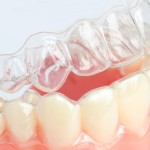
The use of mouthguards are important for the prevention of dental and maxillofacial injuries when participating in contact support. Mouthguards buffer the impacts or blows that might otherwise cause moderate to severe dental and maxillofacial injuries. Mouthguards were recommended by the American Dental Association in 1950. However, while they have been shown to reduce injury there is a reluctance among some to wear them, with discomfort, breathing and speech difficulties, and interference in athletic performance being commonly cited. Therefore the aim of this trial was to evaluate and compare the effect of two different types of mouthguards on the athletic performance and strength of collegiate athletes.
A small group of athletes aged 19 to 23 years (n=18) were randomised to three groups and performed the same sequence of exercises designed to test strength and performance on three consecutive Mondays, wearing wither a custom-made mouthguard , an over-the-counter boil-and-bite mouthguard or no mouthguard. Following the tests, each athlete completed a brief anonymous survey aimed at evaluating the athletes’ overall satisfaction with each type of mouthguard.
They found that custom-made mouthguards
- had no detrimental effect on athletic strength and performance
- were reported by the athletes as being comfortable and not causing difficulty in breathing.
In contrast, boil-and-bite mouthguards did not perform as well and were reported as being uncomfortable and causing breathing difficulties.
They concluded
Based on the results of this study, the use of custom-made mouthguards should be encouraged in contact sports as a protective measure, without concern for any negative effect on the athletic performance of the athletes.
Duddy FA, Weissman J, Lee RA Sr, Paranjpe A, Johnson JD, Cohenca N. Influence of different types of mouthguards on strength and performance of collegiate athletes: a controlled-randomized trial. Dent Traumatol. 2012 Jan 25. doi: 10.1111/j.1600-9657.2011.01106.x. [Epub ahead of print] PubMed PMID: 22272945.
Comment
This is only a small study but it addresses an interesting issue as a recent study in Italian rugby players ( Boffano et al ) found that,
Only 53.85% of the subjects reported wearing their mouthguard all the time both during training and games. The most commonly reported problem associated with using a mouthguard was the discomfort on speech, followed by difficulty in closing lips, adversely affected breathing, adversely affected swallowing and slipping sensation.
encouraging more athletes participating in contact sport to regularly wear their mouthguards is therefore likely to have a positive effect on oral injuries.
Boffano P, Boffano M, Gallesio C, Roccia F, Cignetti R, Piana R. Rugby athletes’ awareness and compliance in the use of mouthguards in the North West of Italy. Dent Traumatol. 2011 Oct 4. doi: 10.1111/j.1600-9657.2011.01067.x. [Epub ahead of print] PubMed PMID: 21967600.

[…] Custom-made mouthguards had no detrimental effect on athletic strength and performance […]